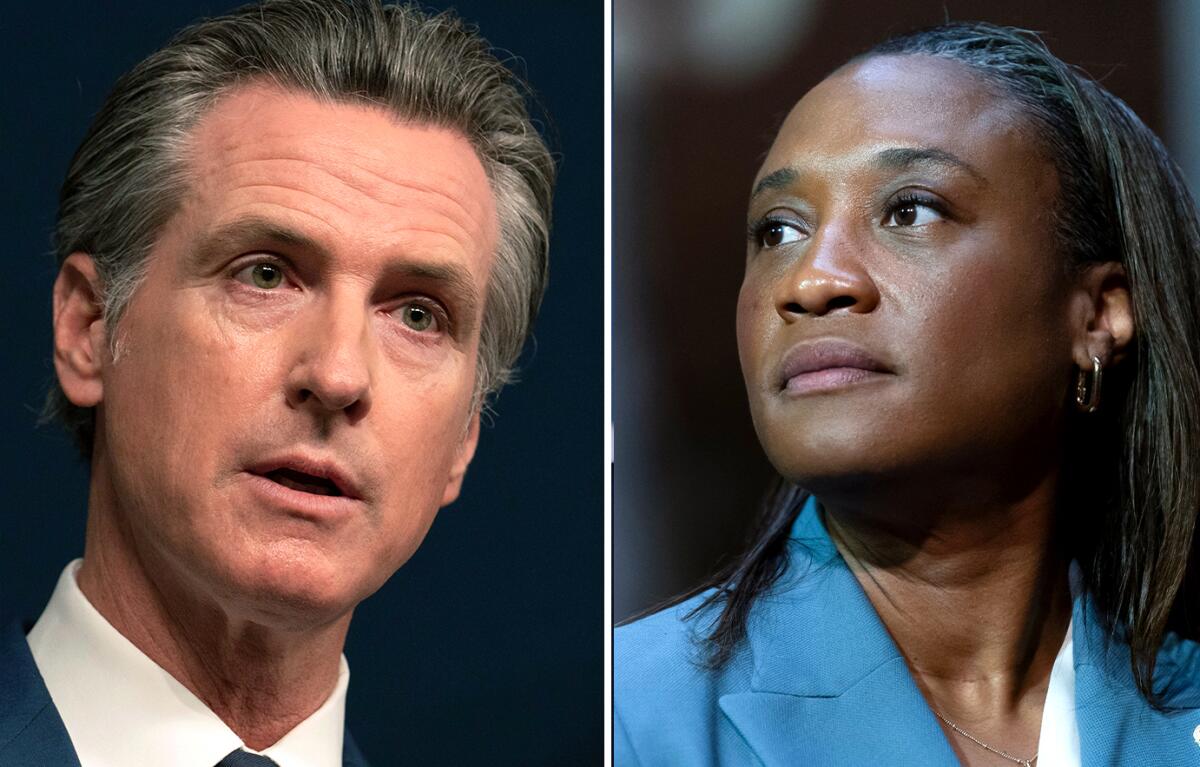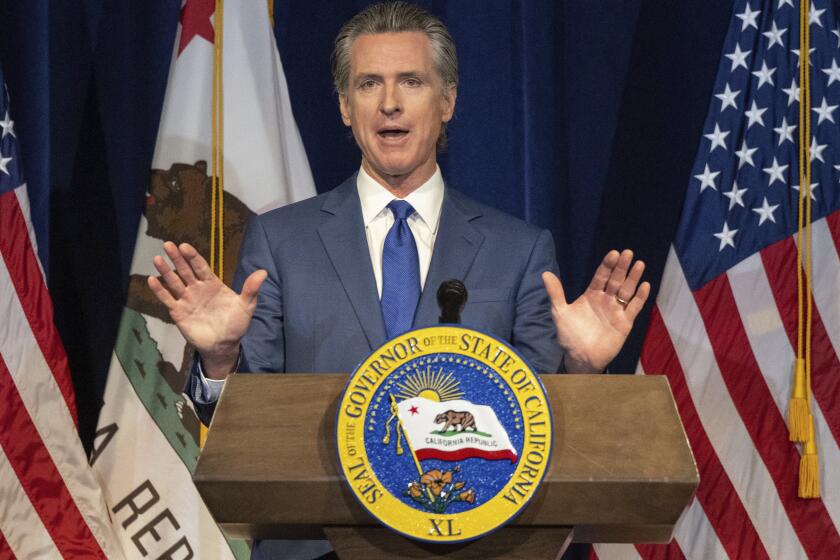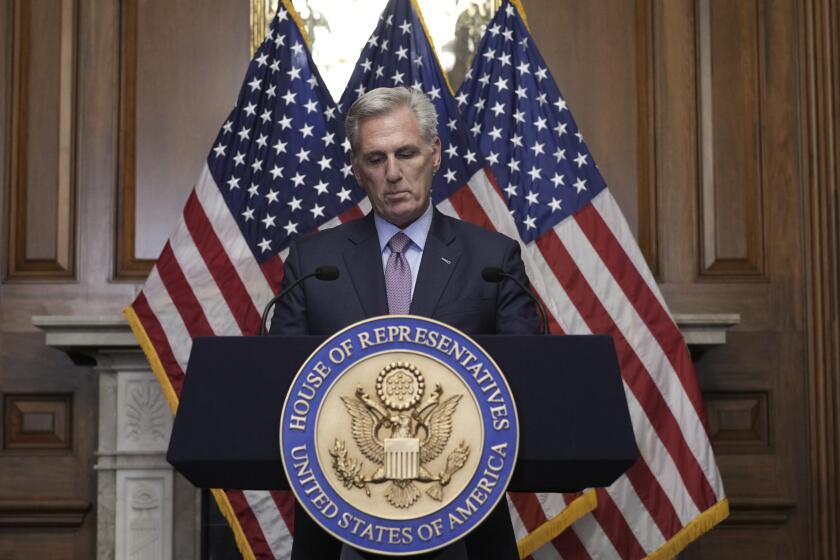Column: Newsom stumbled in filling Feinstein seat. Or did he? Our columnists discuss

- Share via
Acting with dispatch, Gov. Gavin Newsom this week appointed Laphonza Butler, a veteran labor organizer and political strategist, to replace the late Dianne Feinstein in the U.S. Senate.
The move fulfilled a promise Newsom made to choose a Black woman, filling a notable void.
With Vice President Kamala Harris’ exit, there were no Black women among the 100 members of the august chamber. In fact, before Butler, there had been only two Black women senators in the history of the country.
Butler, 44, was sworn into office Tuesday by Harris, a friend and former political client. She is the first openly LGBTQ+ person of color to serve in the Senate.
Times columnists Erika D. Smith, Anita Chabria and Mark Z. Barabak discussed the history-making selection, speculation about Butler’s future and the problems Newsom created for himself filling Feinstein’s seat.
Barabak: So, a pretty big deal for California and Newsom. How come there isn’t a more celebratory mood shrouding our governor?
Chabria: I’m not sure there isn’t, behind the scenes anyway. Appointing Butler was an elegant solution to a big political problem. He did not want to anger Reps. Adam Schiff (D-Burbank) or Katie Porter (D-Irvine) — or their powerful allies and donors — by giving the seat to Rep. Barbara Lee (D-Oakland).
That was always about Newsom’s political future, not the will of the people, as he claimed.
Even as insurers flee California, lawmakers couldn’t hammer out a deal to fix the collapsing market. Inaction will only make disasters more expensive.
But as Erika pointed out, there was a lot of anger the governor would try to talk a Black female politician into undermining Lee by serving for a few months as senator, then stepping aside with nothing to show for it.
So Newsom was, late in the game, forced to drop that placeholder idea, but not before a backlash solidified — leaving him few options.
Butler is somewhat genius in that respect. She is liked in Democratic circles and powerful — nationally, not just in California. The strongest complaint against her so far is that she owns a house in Maryland. I think the governor is probably celebrating.
What do you think, Erika?
Smith: Butler is definitely an inspired choice. She checks a lot of boxes — and not just demographically. Her career includes stints in labor, political, corporate and academic circles. She has had a major impact in all of them, ultimately making the lives of working-class people in California better.
And, yes, I love that she is a Black queer woman in her mid-40s, because I also am a Black queer woman in my 40s, and it’s nice to finally have some representation in the Senate.
So I’m happy. But that doesn’t mean everyone is happy.
California’s governor vowed to pick a Black woman to fill the vacancy in the Senate. But he won’t get many takers without the ability to run again.
That’s because in picking Butler, Newsom more or less doomed the campaign of Lee, the 77-year-old Black woman who many had hoped would end up in the Senate.
Lee is lagging badly in the polls behind Schiff and Porter, and running as a sitting senator could’ve given her a badly needed boost.
It’s also unclear whether Butler will merely finish out Feinstein’s term or run in 2024, meaning these next few months might be the last time we see a Black woman in the Senate from California. The state’s declining Black population has bred all sorts of pessimism.
So the mood you sense is a mixture of disappointment, excitement and consternation. People like Butler, but they also like Lee, and they are torn emotionally.
Mark, do you think Lee’s supporters basically overplayed their hand?
Barabak: I do.
I think it started with an effort to shove the ailing Feinstein aside, then pressure Newsom into appointing Lee, who is well to Feinstein’s political left.
Liberals — or progressives, if you prefer — never liked Feinstein much and I think they believed, to use Anita’s words, appointing Lee as her replacement would have been an elegant solution.
I disagree.
For one thing, Newsom already appointed one of our senators, to replace Harris when she became vice president. (Though, it should be noted, Alex Padilla did stand for election and win handily in November.)
The governor has also chosen California’s attorney general and secretary of state.
That’s plenty.
If Lee wants to serve in the Senate, she should do exactly what she’s doing, which is run for the job and try to win the most votes.
But my problem with Newsom goes beyond his serial appointments.
I think he royally mucked up this whole process, starting with his ill-considered promise back in March 2021 to appoint a Black woman to replace Feinstein.
Fine intention, badly executed.
Here’s why: Whenever someone promises to appoint a Black woman, or a Latino or pudgy white guy with a bad comb-over to some political position, a not-insignificant number of people will assume the only reason that person was chosen was because they were a Black woman, or a Latino or a white guy with a bad comb-over.
Newsom could have just appointed Butler, or another Black woman, and extol his selection based on her merits.
But if he hadn’t made that promise he wouldn’t have gotten the credit he wanted or tamped down the anger of Black voters — unhappy with the selection of Padilla — whose support he needed as he faced a threatened recall.
And then there’s his flip-flopping over whether his appointee would be a caretaker or not. Not a great look.
Anita, should Newsom have chosen a placeholder, or someone wanting an extended stay in the Senate?
Chabria: I am going to admit to doing my own flip-flop on this. I was strongly in favor of the caretaker idea for exactly the reasons you outline, Mark. Let the people choose.
But the appointment of Butler made me change my mind. She’s powerful and connected, but not a politician.
She has a track record of real-world achievement that I can’t help but love. Through her work at SEIU, she has a strong understanding that America is an aging country and we need to think ahead on Medicare, Social Security and healthcare to plan for the coming silver tsunami, as she has called it.
I think she will make a great senator who offers much more than her box-checking personal life. I want to see her run — and no easy victory is guaranteed here — because she’s more than your typical politician, I know what she stands for, and I like it.
Smith: I’d have to agree, Anita.
I was never a fan of the caretaker idea, and, according to one recent poll from UC Berkeley, neither were voters.
In fact, I find it insulting. As you noted, Mark, Newsom has appointed numerous people to office with no strings attached. So, the governor and his advisors should’ve known that it wasn’t going to fly that he decided to attach some when it came to appointing a Black woman to the Senate.
Newsom had no choice but to change his mind. And I’m thrilled that he did because it gives Butler the opportunity to run, if she so chooses.
Personally, I hope that she does. It will be a slog, especially given the lateness with which she’d be entering the race against some formidable opponents. Butler knows the right people and has the access to collect big money to make a serious go of it.
What happens to Lee? I don’t know.
Newsom may have mucked this up, giving in to his worst political instincts by talking about making a decision, rather than just making the decision. But at least it was ultimately a good decision.
McCarthy’s ouster from a job he long coveted was induced by far-right Republicans with the support of vengeance-minded Democrats. It was dramatic, but no surprise.
Barabak: Looks like I’m outvoted on the caretaker thing, but it’s immaterial now. California has a new U.S. senator, and she’s got the power of incumbency behind her.
Though, as you suggest, Erika, getting elected will be a slog. Butler not only has to acclimate herself to the Senate but, if she does run, crank up a campaign in no time — all while repeatedly schlepping 2,500 miles back-and-forth between Washington and California.
I wouldn’t underestimate how hard it is to become known in a place with nearly 40 million residents, sprawled over a massive geographic area.
Plus, there’s not a lot of time for Butler to make up her mind whether to run.
The primary is March 5, but to be included in the information guide sent to registered voters, Butler would need to file a candidate statement by Nov. 15.
And if she hoped to win the endorsement of the California Democratic Party, its website lists Oct. 13 as the deadline to submit the necessary paperwork.
So a decision will have to come fairly soon, and who knows what Butler will decide.
But here’s one thing I’d bet: Newsom is glad this whole episode is behind him. Now he can give his undivided attention to next month’s scheduled cage match with his longtime scourge, Florida Gov. Ron DeSantis.
More to Read
Get the latest from Mark Z. Barabak
Focusing on politics out West, from the Golden Gate to the U.S. Capitol.
You may occasionally receive promotional content from the Los Angeles Times.















